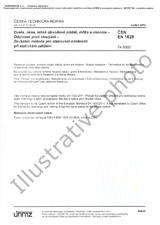We need your consent to use the individual data so that you can see information about your interests, among other things. Click "OK" to give your consent.
ČSN ETSI EN 300330-1-V1.8.1 (875026)
Electromagnetic compatibility and Radio spectrum Matters (ERM); Short Range Devices (SRD); Radio equipment in the frequency range 9 kHz to 25 MHz and inductive loop systems in the frequency range 9 kHz to 30 MHz; Part 1: Technical characteristics and test methods EUROPEAN STANDARD ČSN ETSI EN 300 330-1 V1.8.1
Automatically translated name:
Electromagnetic compatibility and radio spectrum ( ERM ) - Short Range Devices ( SRD ) - Radio equipment in the frequency range of 9 kHz to 25 MHz and inductive loop systems in the frequency range of 9 kHz to 30 MHz - Part 1 : Technical characteristics ( standard for direct corrections).
STANDARD published on 1.9.2015
The information about the standard:
Designation standards: ČSN ETSI EN 300330-1-V1.8.1
Classification mark: 875026
Catalog number: 98465
Publication date standards: 1.9.2015
SKU: NS-614216
The number of pages: 72
Approximate weight : 216 g (0.48 lbs)
Country: Czech technical standard
Category: Technical standards ČSN
The category - similar standards:
Receiving and transmitting equipmentOther equipment for radiocommunicationsElectromagnetic compatibility in generalEmission
Annotation of standard text ČSN ETSI EN 300330-1-V1.8.1 (875026):
V1.8.1
The present document applies to the following Short Range Device major equipment types:
- 1) Generic Short range Devices including transmitters operating in the range from 9 kHz to 25 MHz; and
- 2) inductive loop transmitters operating from 9 kHz to 30 MHz including Radio Frequency Identification (RFID) and EAS operating in LF and HF ranges and for radio equipment including wireless power transfer (WPT) function in the same frequency range;
- 3) receivers of systems as defined by bullets 1 and 2.
These radio equipment types are capable of operating in the permitted frequency bands within the 9 kHz to 30 MHz range as specified in table 1:
- " either with a Radio Frequency (RF) output connection and dedicated antenna or with an integral antenna;
- " for all types of modulation;
- " receivers of systems as defined by bullets 1 and 2.
Table 1 shows a list of the frequency bands as designated to Short Range Devices and the CEPT/ERC/REC 70-03 [i.1] as known at the date of publication of the present document.
When selecting parameters for new SRDs, which may have inherent safety of human life implications, manufacturers and users should pay particular attention to the potential for interference from other systems operating in the same or adjacent bands.
The present document covers fixed stations, mobile stations and portable stations. If a system includes transponders, these are measured together with the transmitter.
All types of modulation for radio devices are covered by the present document, provided the requirements of clause 7.3 are met.
The radio equipment, covered by the classification SRD is divided into several classes based on the maximum radiated magnetic field strength. The field strength designation in the present document is based on CEPT/ERC/REC 70-03 [i.1] and National SRD-frequency designations.
Three types of measuring methods are defined in the present document due to the varied nature of the antenna types for equipment used in this band. One method measures the RF carrier current, another measures the radiated H-field and the third conducted power.
The present document covers requirements for radiated emissions below as well as above 30 MHz.
Additional standards or specifications may be required for equipment such as that intended for connection to the Public Switched Telephone Network (PSTN).
The present document covers fixed stations, mobile stations and portable stations.
Applications using Ultra-WideBand (UWB) technology are not covered by the present document
Preview of the standard ČSN ETSI EN 300330-1-V1.8.1 (875026)
We recommend:
Technical standards updating
Do you want to make sure you use only the valid technical standards?
We can offer you a solution which will provide you a monthly overview concerning the updating of standards which you use.
Would you like to know more? Look at this page.




 Cookies
Cookies
